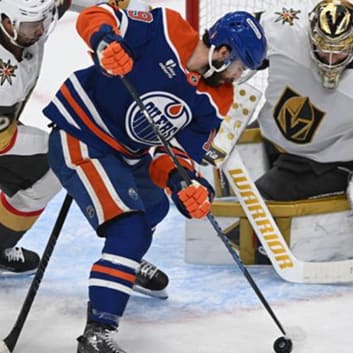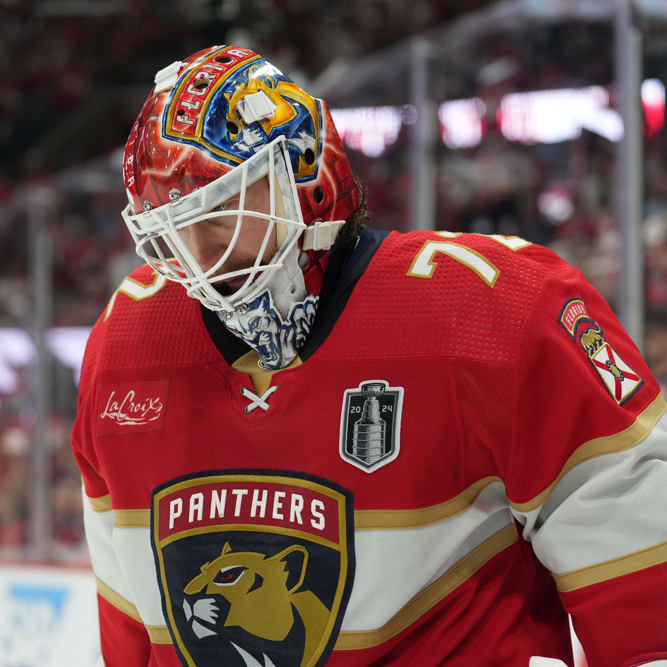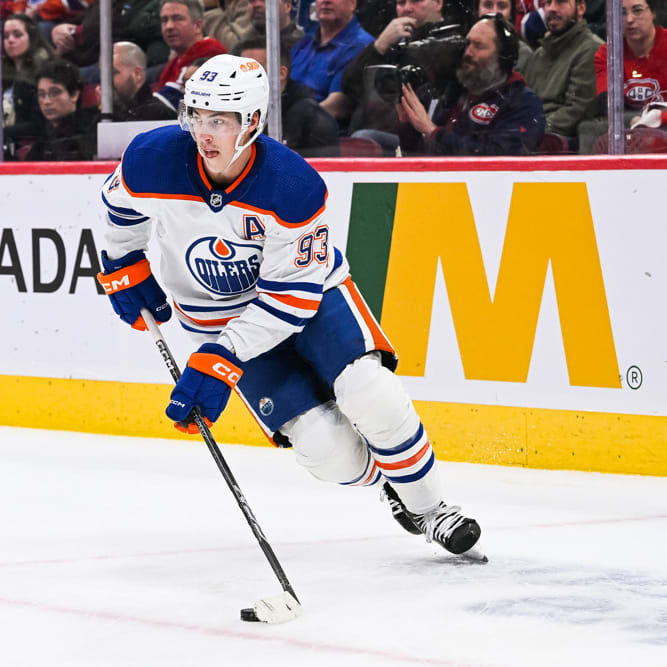This article is part of our Team Previews series.
OUTLOOK
The Bruins entered the 2009-10 season filled with promise after rising to the top of the Eastern Conference the year before, with a spiffy 53–19–10 record. True, the B's had fizzled out in the Eastern Conference semifinals, but the team's regular season prowess, suggested another campaign among the league's elite.
Despite the trade of young sniper Phil Kessel, the team looked deep and talented, backstopped by goalie Tim Thomas, the NHL's reigning Vezina Trophy winner.
Compensating for the loss of Kessel, Boston envisioned a committee approach, featuring the return of Marco Sturm from a knee injury and the anticipated development of young forwards such as David Krejci, Milan Lucic and Blake Wheeler. However, replacing Kessel's 36 goals and electric presence up front proved problematic. When coupled with lengthy injuries to Marc Savard and Lucic, the B's ended up going from 274 goals for (second in the league in 2008-09) to next to last in scoring last season, with 206 goals. Krejci and Patrice Bergeron tied for the team lead in scoring with just 52 points each.
What kept the team afloat was another campaign's worth of responsible defensive play from a solid blueline corps and continued excellence in goal. The result was just 200 goals allowed, the second-lowest total in the league. Rookie Tuukka Rask took advantage of a Thomas injury and seized the team's top goaltending job, relegating his veteran counterpart to highly-paid backup status.
With mustering consistent offense a season-long problem, the Bruins
OUTLOOK
The Bruins entered the 2009-10 season filled with promise after rising to the top of the Eastern Conference the year before, with a spiffy 53–19–10 record. True, the B's had fizzled out in the Eastern Conference semifinals, but the team's regular season prowess, suggested another campaign among the league's elite.
Despite the trade of young sniper Phil Kessel, the team looked deep and talented, backstopped by goalie Tim Thomas, the NHL's reigning Vezina Trophy winner.
Compensating for the loss of Kessel, Boston envisioned a committee approach, featuring the return of Marco Sturm from a knee injury and the anticipated development of young forwards such as David Krejci, Milan Lucic and Blake Wheeler. However, replacing Kessel's 36 goals and electric presence up front proved problematic. When coupled with lengthy injuries to Marc Savard and Lucic, the B's ended up going from 274 goals for (second in the league in 2008-09) to next to last in scoring last season, with 206 goals. Krejci and Patrice Bergeron tied for the team lead in scoring with just 52 points each.
What kept the team afloat was another campaign's worth of responsible defensive play from a solid blueline corps and continued excellence in goal. The result was just 200 goals allowed, the second-lowest total in the league. Rookie Tuukka Rask took advantage of a Thomas injury and seized the team's top goaltending job, relegating his veteran counterpart to highly-paid backup status.
With mustering consistent offense a season-long problem, the Bruins plugged away to post a 39-30-13 record - third in the Northeast Division and the sixth seed in the East heading into the playoffs. Few expected the team to get past the Ryan Miller-led Sabres in the quarterfinals, but the spoked B's pulled off the upset, setting up a second-round series showdown with the No. 7 seed Flyers. With a spot in the conference finals within reach, Boston built a seemingly insurmountable 3-0 lead in the series, but what followed was one of the NHL's epic collapses: The 3-0 series lead vanished and despite taking a 3-0 goal advantage early in the deciding seventh game, the Bruins became just the third team in league history to blow a 3-0 series lead.
The series, and effectively the Bruins season, turned around when Krejci, who had been providing the team with outstanding two-way play and a much-needed playmaking spark, broke his wrist on a Mike Richards hit. The team's offense, already held together by duct tape, simply could not withstand the loss.
As heartbreaking as the ending was last season, the Bruins are far from a devastated team. In fact, they enter the 2010-11 campaign (once again) deep, talented and buoyed by the drafting of potential franchise player, Tyler Seguin, the first of two first-round picks that the team received from Toronto in the Kessel deal.
Now locked in as the team's top netminder, Rask's ascent to stardom – in real and fantasy terms – figures to continue. Boston fans have witnessed plenty of flashes in the pans between the pipes over the years, but we don't view Rask as a candidate to regress. He's technically sound, but perhaps more importantly, the young Finn's cool-as-a-cumber vibe helps him avoid the peaks and valleys that tend to plague non-elite goalies.
The Bruins should continue to help Rask's cause by playing within coach Claude Julien's defensively responsible system. While the Bruins' blueline unit will miss the puck-moving presence of Dennis Wideman, his inconsistency is something they can do without. Former Norris Trophy winner Zdeno Chara is in a contract year and recovered from a hand injury that limited him last season. Full seasons from Johnny Boychuck, who emerged from AHL obscurity last year and Dennis Seidenberg, who fit the B's like a glove after being acquired at the trade deadline, also bode well for the team's back line. This unit should continue to be a strong one, rounded out by hard-hitting Mark Stuart, a mobile in Matt Hunwick, and the strong-in-the-transition game of Andrew Ference.
The forward corps features depth and plenty of talent, especially down the middle, with the addition of Seguin. Top set-up pivot, Marc Savard, remains a candidate to be dealt, but either way, the team figures to put together more offense this season, with Krejci and two-way stalwart Bergeron also manning the middle. The addition of Nathan Horton, a big and skilled winger is a key one, and the team has a crop of talented youngsters like Joe Colborne and Jordan Caron knocking on the door. Their presence, as well as some of the system's other young forwards, ensures that the team will be able to trot out three balanced and highly-skilled lines, and one energy line, even when injuries hit.
Marco Sturm's latest injury might land him on long-term IR to start the season, which gives the organization some temporary salary cap wiggle, but finances will eventually need to be addressed. Until they are, expect to hear the names of Savard, Thomas and Michael Ryder mentioned as potential salary dumps.
Whether the Bruins are simply a good team this season, or a top shelf one, hinges on how well their attack gels. But the pieces are in place for a championship run in 2010-11. Beyond that, the organization's abundance of talented youth up front should help the team remain competitive and exciting for years to come, even as name-brand veterans are inevitably recycled.
THE BIG GUNS
Zdeno Chara (D): The B's towering blueliner finished the 2009-10 season with 44 points, six off his Norris Trophy-winning mark of the previous campaign. Chara managed to put up a career-high 242 shots on goal last year, but his seven goals represented a significant drop-off from the 19 he put up in 2008-09. The reason? He spent most of the season playing with a balky left hand, a nagging issue that took some of the mustard off his rocket shot. The good news is that Chara should be fully healthy for the start of training camp…and pay attention here…he's in a contract year. Big Z will continue to anchor the Bruins' blue line, and he figures to benefit from having a full season of either Dennis Seidenberg or Johnny Boychuk (players he had good chemistry with last year) playing alongside him from the start.
Marc Savard (C): A Grade 2 concussion that Savard suffered this past March limited the Bruins' top center to 33 points in 41 games in 2009-10. The team's addition of blue-chip center prospect Tyler Seguin in June's draft, coupled with the fact that the B's are in a major salary cap jam, has led to speculation that Savard might be dealt to free up some much-needed money. In any case, when healthy (and he should be entering the upcoming season), Savard is a gifted playmaker who is a lock to be at or above the point-a-game mark, provided he isn't swapped to an offensively-challenged team. He's not the most tenacious defensive forward around, but with a sound defensive team on the upswing like the Bruins, he can put up solid plus-minus numbers. Assuming Savard is not traded, then he'll pivot one of the Bruins' scoring lines.
David Krejci (C): Krejci finished the 2009-10 season in a tie with Patrice Bergeron for the Bruins' scoring lead with 52 points in 79 games. Production-wise, that was a step down from his previous season (73 points), but Krejci still has big-time upside as a playmaker. His importance to the team was illustrated when the Bruins -- who found themselves up 3-0 in their playoff series with the Flyers -- went into a free-fall (eventually losing the series) after he went down with a dislocated wrist that required surgery. Krejci expects to be ready when training camp opens in September, and the B's can only hope at 100-percent, as his soft hands and deft touch are keys to his game. For now, he slots in as the team's No. 2 playmaking center behind Marc Savard, but his veteran counterpart may be dealt for cap reasons and if that happens it could lead to added responsibility/production for Krejci, who is quite capable of putting up a point-per-game, or more.
Tuukka Rask (G): Rask finished his stellar rookie season with a 22-12-5 record with a sparkling 1.97 goals-against average and .931 save percentage. He should enter the 2010-11 campaign as the Bruins' undisputed top goaltender (even if former Vezina winner Tim Thomas is not dealt) and figures to be among the top tier of goalies in our preseason fantasy rankings. There's always the possibility that hotshot youngsters can regress, but Rask is one cool customer whose unflappable nature and sound technique could help him avoid such an occurrence.
Patrice Bergeron (C): Bergeron finished last season tied for the Bruins' scoring lead with 52 points in 73 games, numbers that aren't gaudy, but his true value lies with the effective two-way effort he gives the team every night. With the addition of hotshot rookie Tyler Seguin, the Bruins remain deep and talented down the middle, so Bergeron will reprise his role as the team's ace and all-around pivot, with the likes of Marc Savard (if he is not dealt) and David Krejci working as the team's top playmaking centers.
Nathan Horton (C): Horton, who scored 20 goals and 37 assists in 65 games in 2009-10, has had his work ethic questioned at times, but the talent is there and perhaps a change of scenery from Florida to Boston will be the jump-start he needs. The 25-year-old projects as a top-six forward with the Bruins, one who can use his big body (6-foot-2, 229-pounds) to play a power/skill combo game when he is on.
ON THE RISE
Milan Lucic (LW): Lucic battled nagging injuries (notably a high ankle sprain) during the 2009-10 regular season, finishing with just nine goals and 20 points in 50 games, but the budding power forward's strong playoff performance (nine points and 19 PIMs in 13 games) bodes well for an uptick in production this coming season. When he's on, Lucic intimidates as a bone-jarring hitter who is tough to knock off the puck. While he'll never be the smoothest player out there, he does possess solid instincts on offense. Assuming he plays on one of the B's top lines, which seems likely, he could be a useful fantasy left wing, especially in leagues where PIMs and plus/minus are factored in.
Johnny Boychuck (D): Boychuk went from a virtual unknown last season to an offseason priority for the Bruins, signing a two-year extension worth approximately $3.75 million this spring. Boychuk started last season as the team's No. 7 blueliner, but when given an opportunity, he proved he belonged in the NHL. He ended up on the B's top defensive pairing with Zdeno Chara and racked up heavy minutes, especially late in the season and the playoffs. Heading into 2010-11, he could see a bump up from his 2009-10 production (15 points in 51 games) if he ends up seeing extensive power-play duty, which is certainly a possibility.
TWO TO AVOID
Tim Thomas (G): Thomas, who is coming off offseason hip surgery, said he'll be ready for the start of training camp and as long as he remains with the Bruins -- and it would be tough to trade him given his lucrative deal -- he projects as a talented, respected, and very well-paid backup. Rising young star Tuukka Rask would have to regress in a big way (or suffer an injury) for the veteran Thomas, who won the Vezina Trophy in 2008-09, to reclaim the B's starting goalkeeper gig. Keep in mind that if Thomas is dealt, while it would likely provide him with a boost in his value in terms of playing time, it's quite possible that he could wind up on a less defensively-responsible team than the Bruins.
Michael Ryder (RW): Ryder, who had 27 goals and 53 points in his first season in black and gold, struggled with his consistency in 2009-10, finishing with just 18 goals and 33 points in 82 games. Ryder can be determined with the puck in the offensive zone, making it hard to take it away from him when he has a full head of steam. He also can fire the puck well, but as effective as he can be, Ryder's production/compete level doesn't always match his cap hit of $4 million, making him a candidate to be dealt or even demoted to the minors to free up some needed cap room for the team. His ceiling is 30-plus goals, but this year his floor could be a ticket to AHL Providence if one of the B's younger, cheaper forwards outplays him in training camp.
TOP PROSPECTS
Tyler Seguin (C): The long-term scouting report on Seguin, the second overall pick in the 2010 NHL Entry Draft, is a pretty good one. He has top-end speed, great hands, is a good passer, and his hockey sense is among the best in this year's draft class. Not only does he have plenty of scoring upside, he'll also definitely make the guys around him better and he's a coveted right-hand centerman. Already under contract, he can now focus on his goal of cracking the Bruins' roster come training camp. Odds are that he will, and while his future is bright, the Bruins' current depth at center -- some would call it a glut of talent -- makes it a little difficult at this time to project his exact role out of the gate. He may even start his NHL career as a winger if Marc Savard isn't dealt, but while he's not going to hit his peak production out of the gate, it's not hard to imagine Seguin averaging a point every other game, while giving us glimpses of his future offensive prowess.
Joe Colborne (C): Colborne, whose natural position is center, is poised to start his first full season as a pro as a wing. The Bruins are deep at center, so in terms of team needs and for Colborne to get on the fast track to the NHL, him playing on the wing makes a ton of sense. To that end, he played most of his sophomore season at the University of Denver and in six games for AHL Providence at the end of 2009-10, on the wing. Colborne, who weighed 190 pounds when he was drafted, has gotten bigger -- he's up to 6-5/215 -- and has improved his skating since then, which has helped him add some physicality to his game. He's no slouch with the puck and while Colborne isn't expected to crack the Bruins' roster to start the 2010-11 season, he could buck the odds and stick, as Blake Wheeler did a couple of years back.
Jordan Caron (C): Caron, who was the 25th overall pick in 2009 NHL draft, could contend for a roster spot with the B's this season, but more than likely, the team's depth up from will force him to spend 2010-11 with AHL Providence. He has power forward upside as a pro, as long as he can stay healthy, which is something that has hardly been a given for him.
Brad Marchand (RW): Marchand will be looking to win a steady job with the B's in his third pro season after playing 20 games in Boston last year. He only notched one assist in his stint with the big club, but he's a scrappy player, who is not without some upside on offense, as his 32 points in 34 games with AHL Providence illustrates. His best chance to stick with the Bruins out of camp is to win a spot on the team's energy line, a job that he has a chance to win, but one that doesn't carry much fantasy weight.
Yuri Alexendrov (D): Alexandrov, the Bruins' second-round draft pick in 2006 (37th overall), is considered a mobile puck mover, but at this stage he will need to adjust to the physicality of the North American pro game, which will be a challenge as he continues to fill out his 6-1, 185-pound frame. Look for him to start 2010-11 with AHL Providence, but note that he does have enough upside on offense (he has power play potential) to be an option in keeper leagues.









